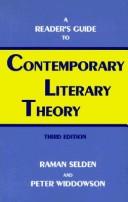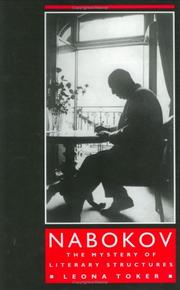| Listing 1 - 10 of 11 | << page >> |
Sort by
|

ISBN: 0813118115 0813164818 9780813164816 9780813118116 Year: 1993 Publisher: Lexington, Ky. University Press of Kentucky
Abstract | Keywords | Export | Availability | Bookmark
 Loading...
Loading...Choose an application
- Reference Manager
- EndNote
- RefWorks (Direct export to RefWorks)
The importance of the ethics of form in literature has only recently gained broad recognition and has thus far been explored mainly from the position of moral philosophy and critical theory. Leona Toker develops a narratological approach to the subject, based on studying ""reticence"" in works of fiction.Reticence consists in narrative techniques through which writers create information gaps that build interest, enhance tension, and control the reader's comprehension of theme, character, and event. Using novels by Fielding, Austen, Dickens, Conrad, Forster, and Faulkner, Toker demonstrates how
English fiction --- Silence in literature --- Narration (Rhetoric) --- Fiction --- History and criticism --- Technique --- Silence in literature. --- History and criticism. --- Technique. --- Narration (Rhetoric). --- Fiction writing --- Metafiction --- Writing, Fiction --- Authorship --- Narrative (Rhetoric) --- Narrative writing --- Rhetoric --- Discourse analysis, Narrative --- Narratees (Rhetoric) --- English fiction - History and criticism --- Fiction - Technique

ISBN: 1501707221 1501707043 0801422116 9781501707049 9780801422119 9781501707223 Year: 1989 Publisher: Cornell University Press
Abstract | Keywords | Export | Availability | Bookmark
 Loading...
Loading...Choose an application
- Reference Manager
- EndNote
- RefWorks (Direct export to RefWorks)
Vladimir Nabokov described the literature course he taught at Cornell as "a kind of detective investigation of the mystery of literary structures." Leona Toker here pursues a similar investigation of the enigmatic structures of Nabokov's own fiction. According to Toker, most previous critics stressed either Nabokov's concern with form or the humanistic side of his works, but rarely if ever the two together. In sensitive and revealing readings of ten novels, Toker demonstrates that the need to reconcile the human element with aesthetic or metaphysical pursuits is a constant theme of Nabokov's and that the tension between technique and content is itself a key to his fiction. Written with verve and precision, Toker's book begins with Pnin and follows the circular pattern that is one of her subject's own favored devices.
Nabokov, Vladimir Vladimirovich, --- Criticism and interpretation. --- Sirin, Vladimir, --- Sirin, Vl. --- Sirin, V. --- Nabokoff-Sirin, Wladimir, --- Sirin, Wladimir Nabokoff-, --- Nabokov, Vladimir, --- Shishkov, Vasiliĭ, --- Набоков, Владимир Владимирович, --- Набоков, Владимир, --- נאבוקוב, ולאדימיר ולאדימירוביץ׳, --- נאבוקוב, ולאדימיר, --- נבוקוב, ולדימיר, --- 納布可夫, --- Nabokov, Vladimir --- Nabokov, Vladimir Vladimirovich --- Godunov-Cherdynt︠s︡ev, Fedor --- American literature. --- LITERARY CRITICISM / Modern / 20th Century . --- English literature --- Agrarians (Group of writers) --- Vladimir Nabokov --- Lolita --- Russian literature --- Pnin --- literary structures --- humanism
Book
ISBN: 9780253043511 9780253043542 9780253043559 0253043549 0253043514 0253043557 9780253043528 9780253043535 0253043530 Year: 2019 Publisher: Bloomington Indiana University Press
Abstract | Keywords | Export | Availability | Bookmark
 Loading...
Loading...Choose an application
- Reference Manager
- EndNote
- RefWorks (Direct export to RefWorks)
Devoted to the ways in which Holocaust literature and gulag literature provide contexts for each other, Leona Toker shows how the prominent features of one shed light on the veiled features and methods of the other. Toker views these narratives and texts against the background of historical information about the Soviet and the Nazi regimes of repression. Writers at the center of this work include Varlam Shalamov, Primo Levi, Elie Wiesel, and Ka-Tzetnik, and others including Alexandr Solzhenitsyn, Evgeniya Ginzburg, and Jorge Semprun illuminate the discussion. Toker's twofold analysis concentrates on the narrative qualities of the works as well as how each text documents the writer's experience. She provides insight into how fictionalized narrative can double as historical testimony, how references to events might have become obscure owing to the passage of time and the cultural diversity of readers, and how these references form new meaning in the text. Toker is well-known as a skillful interpreter of gulag literature, and this text presents new thinking about how gulag literature and Holocaust literature enable a better understanding about testimony in the face of evil.
Concentration camp inmates' writings --- Writings of concentration camp inmates --- Literature --- History and criticism --- E-books
Book
ISBN: 1501707035 Year: 2017 Publisher: Ithaca : Cornell University Press,
Abstract | Keywords | Export | Availability | Bookmark
 Loading...
Loading...Choose an application
- Reference Manager
- EndNote
- RefWorks (Direct export to RefWorks)
Vladimir Nabokov described the literature course he taught at Cornell as "a kind of detective investigation of the mystery of literary structures." Leona Toker here pursues a similar investigation of the enigmatic structures of Nabokov's own fiction. According to Toker, most previous critics stressed either Nabokov's concern with form or the humanistic side of his works, but rarely if ever the two together. In sensitive and revealing readings of ten novels, Toker demonstrates that the need to reconcile the human element with aesthetic or metaphysical pursuits is a constant theme of Nabokov's and that the tension between technique and content is itself a key to his fiction. Written with verve and precision, Toker's book begins with Pnin and follows the circular pattern that is one of her subject's own favored devices.
Book
ISBN: 9780814211229 Year: 2010 Publisher: Columbus Ohio State university press
Abstract | Keywords | Export | Availability | Bookmark
 Loading...
Loading...Choose an application
- Reference Manager
- EndNote
- RefWorks (Direct export to RefWorks)
Ethics in literature --- Literary form --- Literature --- Aesthetics --- Austen, Jane, 1775-1817 --- Conrad, Joseph, --- Dickens, Charles --- Eliot, George, --- Fielding, Henry --- Hardy, Thomas, --- Hawthorne, Nathaniel, --- Joyce, James --- Kafka, Franz --- Shalamov, Varlam Tikhonovich --- Sterne, Laurence --- Criticism and interpretation. --- Criticism and interpretation. --- Criticism and interpretation. --- Criticism and interpretation. --- Criticism and interpretation. --- Criticism and interpretation. --- Criticism and interpretation. --- Criticism and interpretation. --- Criticism and interpretation. --- Criticism and interpretation. --- Criticism and interpretation.
Book

ISBN: 9783839441596 Year: 2018 Publisher: Bielefeld
Abstract | Keywords | Export | Availability | Bookmark
 Loading...
Loading...Choose an application
- Reference Manager
- EndNote
- RefWorks (Direct export to RefWorks)
Book

ISBN: 9783110631135 Year: 2019 Publisher: Berlin Boston
Abstract | Keywords | Export | Availability | Bookmark
 Loading...
Loading...Choose an application
- Reference Manager
- EndNote
- RefWorks (Direct export to RefWorks)
Book

ISBN: 1283627914 9786613940360 3110259974 9783110259971 9783110259957 3110259958 Year: 2012 Publisher: Berlin Boston
Abstract | Keywords | Export | Availability | Bookmark
 Loading...
Loading...Choose an application
- Reference Manager
- EndNote
- RefWorks (Direct export to RefWorks)
Recent postclassical narratology has constructed top-down reading models that often remain blind to the frame-breaking potential of individual literary narratives. Narrative, Interrupted goes beyond the macro framing typical of postclassical narratology and sets out to sketch approaches more sensitive to generic specificities, disturbing details and authorial interference. Unlike the mainstream cognitive approaches or even the emergent unnatural narratology, the articles collected here explore the artifice involved in presenting something ordinary and realistic in literature. The first section of the book deals with anti-dynamic elements such as dialogue, details, private events and literary boredom. The second section, devoted to extensions of cognitive narratology, addresses spatiotemporal oddities and the possibility of non-human narratives. The third section focuses on frame-breaking, fragmentarity and problems of authorship in the works of Vladimir Nabokov. The book presents readings of texts ranging from the novels of Don DeLillo and Thomas Pynchon to the Animal Man comics. The common denominator for the texts discussed is the interruption of the chain of events or of the experiential flow of human-like narrative agents.
Discourse analysis, Narrative. --- Narration (Rhetoric) --- Literature --- Narrative (Rhetoric) --- Narrative writing --- Rhetoric --- Discourse analysis, Narrative --- Narratees (Rhetoric) --- Narrative discourse analysis --- History and criticism --- Theory, etc. --- Literature History and criticism --- Literary Authorship. --- Narrative Theory. --- Vladimir Nabokov.
Book

ISBN: 1618110160 9781618110169 9781934843444 193484344X 9781934843697 1934843695 Year: 2009 Publisher: Boston, MA
Abstract | Keywords | Export | Availability | Bookmark
 Loading...
Loading...Choose an application
- Reference Manager
- EndNote
- RefWorks (Direct export to RefWorks)
The Twentieth Century Russian Short Story: A Critical Companion is a collection of the most informative critical articles on some of the best twentieth-century Russian short stories from Chekhov and Bunin to Tolstaya and Pelevin. While each article focuses on a particular short story, collectively they elucidate the developments in each author's oeuvre and in the subjects, structure, and themes of the twentieth-century Russian short story. American, European and Russian scholars discuss the recurrent themes of language's power and limits, of childhood and old age, of art and sexuality, and of cultural, individual and artistic memory. The book opens with a discussion of the short story genre and its socio-cultural function. This book will be of value to all scholars of Russian literature, the short story, and genre theory.
Russian fiction -- 20th century -- History and criticism. --- Short stories, Russian -- History and criticism. --- Short stories, Russian --- Russian fiction --- Languages & Literatures --- Slavic, Baltic and Albanian Languages & Literatures --- Russian short stories --- History and criticism
Book

ISBN: 9781789203660 Year: 2000 Publisher: New York Oxford
Abstract | Keywords | Export | Availability | Bookmark
 Loading...
Loading...Choose an application
- Reference Manager
- EndNote
- RefWorks (Direct export to RefWorks)
| Listing 1 - 10 of 11 | << page >> |
Sort by
|

 Search
Search Feedback
Feedback About UniCat
About UniCat  Help
Help News
News